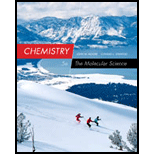
Concept explainers
Interpretation:
Molecular formula of the given hydrocarbon has to be determined using the given data.
Concept Introduction:
Ideal gas Equation:
Where,
Number of moles (n):
M is the molar mass and m is the mass of the given substance.
Pressure can be expressed in different units. But it is normally reported in
General unit conversions:
Answer to Problem 38QRT
The molecular formula is
Explanation of Solution
Given data is shown below,
Sample of
Amount of
Number of moles of
Empirical formula can be obtained by simplifying the number of moles of
Therefore, empirical formula is
Number of moles of
Number of moles of
Therefore,
Molar mass is determined as follows,
Molar mass is
The value of x and y can be determined by taking ratio of molecular molar mass and molar mass of empirical molar mass where
Therefore,
The molecular formula is
Want to see more full solutions like this?
Chapter 8 Solutions
Chemistry: The Molecular Science
- A collapsed balloon is filled with He to a volume of 12.5 L at a pressure of 1.00 atm. Oxygen, O2, is then added so that the final volume of the balloon is 26 L with a total pressure of 1.00 atm. The temperature, which remains constant throughout, is 21.5 C. (a) What mass of He does the balloon contain? (b) What is the final partial pressure of He in the balloon? (c) What is the partial pressure of O2 in the balloon? (d) What is the mole fraction of each gas?arrow_forwardIf equal masses of O2 and N2 are placed in separate containers of equal volume at the same temperature, which of the following statements is true? If false, explain why it is false. (a) The pressure in the flask containing N2 is greater than that in the flask containing O2. (b) There are more molecules in the flask containing O2 than in the flask containing N2.arrow_forwardYou have two pressure-proof steel cylinders of equal volume, one containing 1.0 kg of CO and the other containing 1.0 kg of acetylene, C2H2. (a) In which cylinder is the pressure greater at 25 C? (b) Which cylinder contains the greater number of molecules?arrow_forward
- Liquid oxygen was first prepared by heating potassium chlorate, KClO3, in a closed vessel to obtain oxygen at high pressure. The oxygen was cooled until it liquefied. 2KClO3(s)2KCl(s)+3O2(g) If 171 g of potassium chlorate reacts in a 2.70-L vessel, which was initially evacuated, what pressure of oxygen will be attained when the temperature is finally cooled to 25C? Use the preceding chemical equation and ignore the volume of solid product.arrow_forwardThe hydrocarbon octane (C8H18) bums to give CO2 and water vapor: 2 C8H18(g) + 25 O2(g) 16 CO2(g) + 18 H2O(g) If a 0.048-g sample of octane burns completely in O2, what will be the pressure of water vapor in a 4.75-L flask at 30.0 C? If the O2 gas needed for complete combustion was contained in a 4.75-L flask at 22 C, what would its pressure be?arrow_forward
 Chemistry: The Molecular ScienceChemistryISBN:9781285199047Author:John W. Moore, Conrad L. StanitskiPublisher:Cengage Learning
Chemistry: The Molecular ScienceChemistryISBN:9781285199047Author:John W. Moore, Conrad L. StanitskiPublisher:Cengage Learning Chemistry & Chemical ReactivityChemistryISBN:9781133949640Author:John C. Kotz, Paul M. Treichel, John Townsend, David TreichelPublisher:Cengage Learning
Chemistry & Chemical ReactivityChemistryISBN:9781133949640Author:John C. Kotz, Paul M. Treichel, John Townsend, David TreichelPublisher:Cengage Learning Chemistry & Chemical ReactivityChemistryISBN:9781337399074Author:John C. Kotz, Paul M. Treichel, John Townsend, David TreichelPublisher:Cengage Learning
Chemistry & Chemical ReactivityChemistryISBN:9781337399074Author:John C. Kotz, Paul M. Treichel, John Townsend, David TreichelPublisher:Cengage Learning- Chemistry: Matter and ChangeChemistryISBN:9780078746376Author:Dinah Zike, Laurel Dingrando, Nicholas Hainen, Cheryl WistromPublisher:Glencoe/McGraw-Hill School Pub Co
 Introductory Chemistry: A FoundationChemistryISBN:9781337399425Author:Steven S. Zumdahl, Donald J. DeCostePublisher:Cengage Learning
Introductory Chemistry: A FoundationChemistryISBN:9781337399425Author:Steven S. Zumdahl, Donald J. DeCostePublisher:Cengage Learning World of Chemistry, 3rd editionChemistryISBN:9781133109655Author:Steven S. Zumdahl, Susan L. Zumdahl, Donald J. DeCostePublisher:Brooks / Cole / Cengage Learning
World of Chemistry, 3rd editionChemistryISBN:9781133109655Author:Steven S. Zumdahl, Susan L. Zumdahl, Donald J. DeCostePublisher:Brooks / Cole / Cengage Learning





